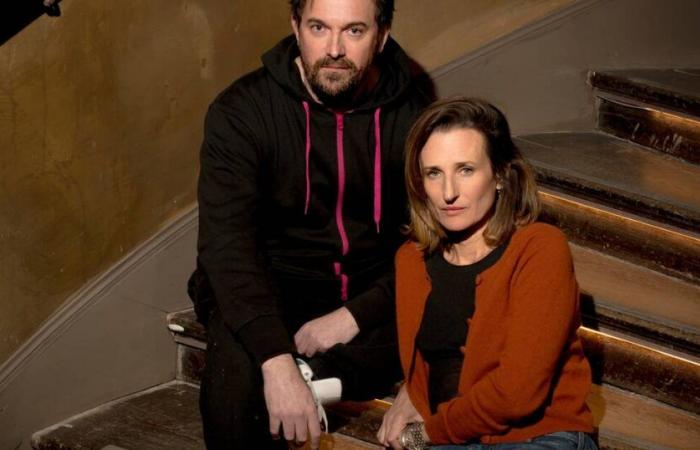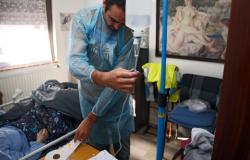A scenography that pulsates, a large pleated purple fabric which completely covers the stage. And a very living leg which emerges from this organic den, isolated from the rest of the body. It moves, folds, beats. This voice, this leg dissociated from everything, then this entire body, youthful, dressed in red, in shorts and bombers, but yes, it is indeed Camille Cottin, a popular actress if ever there was one, rarer in the theater, and who, while assiduously filming as far away as the United States, returns to the stage with an author and a director whom she has chosen, namely the German author Katharina Volckmer and the artist-director well spotted and rather sharp Jonathan Capdevielle.
In his first novel, The Jewish Cock, written directly in English, and whose title remained in original version as if to mask its crudeness or its scandal, Katharina Volckmer, born in 1987, restores the voice of a woman of roughly her age, during a consultation with a doctor who almost never interrupts her, who perhaps doesn’t listen to her, and to whom she asks to transplant a «jewish cock». Little by little, this flow of words which seems to pass from «cock» to the donkey and being focused on a sex change questions the history of Germany and the weight of Nazism on those who are today the grandchildren of the Third Reich. Does guilt become diluted over generations? Is it enough to move into another body, into another language to be able to look with a new distance at the responsibilities of an entire people with regard to the Shoah? To what extent can we free ourselves from a past that we have not experienced but which is part of us?
What led to the choice of The Jewish Cock the Katharina Volckmer ?
Camille Cottin: I was looking for a novel to adapt for the cinema, preferably even before it was translated into French. I called on an agency that connects publishing houses and production companies for an adaptation. And the first novel that was offered to me was The Jewish Cock by Katharina Volckmer. I loved it. Others were offered to me, but I always came back to Katharina Volckmer’s text, which nevertheless has an obviously theatrical form that is difficult to transpose to cinema. The text is so strong that it would have been possible to pose with just a microphone and deliver it, stand-up style. But even before knowing which director to contact, I was sure I wanted it to engage my body, to have a scenography. I admit, I didn’t know the work of Jonathan Capdevielle. I went to see [les pièces] RemiSaga, and I was captivated by this punk dreaminess, this play with the fantastic and the dark, the question of heritage, but also its humor. How to approach him? It had become an obsession. I said to myself: if Jonathan doesn’t want to be there, I will abandon the project.
Jonathan Capdevielle: Camille and I were in two different places. Artistically, geographically, and obviously, in terms of notoriety! I was in Mexico when I received this phone call: “Camille Cottin, do you know? She thought of you to direct a text by Katharina Volckmer.” I read the story straight away. And through the themes of identity and heritage that run through the book, a connection was made. It’s the first time that I worked with an actress that I didn’t know, and what’s more, she’s a “star”.
C.C. : This is the first time that I have initiated a project. Even in the cinema, I never did it. Not yet…
JC: We very quickly decided that we were going to adapt the novel together. We allowed ourselves to rework the translation a little, to sometimes modify the order of certain paragraphs.
C.C. : We share the same totem. It would have been completely different if we had used an adapter.
Was it important that it was a feminist text?
C.C. : Obviously. The first performances took place in Aix-en-Provence [de la fin septembre à début octobre, ndlr], in the middle of the Pelicot trial [au tribunal judiciaire d’Avignon, portant sur les viols infligés à Gisèle Pelicot par Dominique Pelicot et 50 coaccusés, tous condamnés et dont dix-sept ont fait appel], and the text resonated powerfully. In particular, the entire passage on the “vagina which will always be an object of fuck”. Or even on the two ways of sitting depending on whether you are a man or a woman. You could say it’s raw and hard. But Katharina Volckmer is never in the posture. What she talks about still moves through us.
The text also evokes the underground resonances of the Shoah on his generation.
C.C. : What Katharina Volckmer screams as a German born in 1987 is: “Pardon ! So we’re supposed to build after Auschwitz? Do you really think that three generations later, can we accept that we come from it? So look at everything we do to be forgiven, but which neither erases nor forgives.” This weight is one of the axes that Jonathan and I were very keen on. The narrator pays for this penis with a sum coming from her great-grandfather, station master of the last station before Auschwitz.
Camille, what impetus sparked your return to the theater?
C.C. : I dreamed of sharing with the spectators. In cinema, there is a very long delay between filming and broadcast. I had nostalgia for this collective moment of the scene, here and now, never identical to the day before or the day after. I missed that energy, that exchange. In cinema, the body is fragmented. We play with a hand gesture, an expression captured in close-up. On a shoot, I continue to learn how to proceed so that my thoughts are always moving while all the muscles of the face are relaxed. We obey marks. It’s very good, I love this exercise, but I wanted to relive an experience where you play with your whole body. In the theater, I am happy to have a body in freedom, even when the movements are hyper-precise, especially in this show, where I have to dissociate the gestures from the words I pronounce. But I am the master…
From desire to reality: was taking the plunge easy?
C.C. : No ! Particularly because of the extreme availability that the scene requires. In the cinema, you can ask to shift dates or scenes. In the theater, once the decision is made, we must perform, the commitment is irreversible. This requires being clear about your desire for the project to exist. Another obstacle: I had never been alone on set. So, I still tried to turn around once or twice. It never lasted long, there was always someone to catch me.
JC: Marriage is all the more risky because we reserve theaters on a note of intention when nothing yet exists, when we haven’t started rehearsing. The commitment takes place before having a precise idea of the form of the show… We plan ahead. This leap partly into the unknown is obviously less imperative when it comes to a more formatted form of theater, which reproduces existing models.
With few exceptions, it is more the private scenes that call on headliners. Jonathan, when you said that you and Camille were not in the same place, what were you thinking?
JC: Although she started in the theater, Camille is part of the cinema family and this family goes all the way to Ridley Scott! I work in a minority, research and subsidized theater, which has been seriously hampered by budget cuts. And which only exists thanks to a strong cultural policy that elected officials are supposed to and must support. Our alliance makes the increasingly less watertight boundary between public and private more porous. Both through its financing but also because we shoot subsidized but also private stages in the network. So much so that we will meet audiences who would probably never have thought of going to see my work.
What do we think about on stage?
C.C. : Just what I’m doing! Only one on stage is a ring. You don’t have the space to be paranoid, to think about the spectator coughing or looking at their cell phone, because you are so in charge… Yet I am sensitive to the energy that the room sends back to me. Although I know that I can’t trust it too much either. From one evening to the next, the spectators do not laugh in the same place. Jonathan is in management where he does the voice of the doctor live.
We can imagine that this doctor is also the one who manipulates the curtain, inflates the tissues, makes it organic… We don’t have the feeling that you are really alone.
C.C. : Indeed, I feel like I’m breathing with the decor. I didn’t expect it, but my body becomes my puppet. He is my partner. However, I have already played physically demanding roles on stage. When, fifteen years ago, I was doing Helen Keller in Miracle in Alabama [de William Gibson, mis en scène par Bénédicte Budan, ndlr], I was deaf, mute, blind, it was delicious. But here, I work with my body in dissociation. I speak and I act by separating the two.
“I always knew I was a barking cat,” said the heroine. You too ?
C.C. : To be a meowing cat is to obey a norm. Being a barking cat means refusing to live up to expectations or feeling like you don’t belong when you are there. I don’t know if I’m one, but I like to think outside the box. But Katharina goes further. According to her in our standardized societies “no barking cat has ever conquered the sky”.
JC: I understand Katharina’s statement about cross-dressing, which I explored at a very young age. Even today, it is not easy to be part of “those barking cats”. As a child, before puberty, I was injected with hormones because I looked too much like a girl. In the 1980s, general practitioners sometimes decreed: “Such secondary characters are not sufficiently asserted, piquouse! Voice too high, not enough hair: we boost the body.” And besides that, what does it create? A hormonal imbalance. My body was fireworks, I didn’t understand anything. It’s like you’re suddenly being forced to become someone else. Today, would we constrain a child’s body in this way? I don’t think so.
In your opinion, in the play, has the narrator’s transition already taken place or is it in progress?
JC: This question tormented me until it became clear to me that it was an examination and that surgery would be done afterwards. It is clear that today we cannot represent trans characters without asking the question of who embodies them and the issues of this incarnation.
You started imagining this spectacle four years ago, when Europe was not at war, before Trump was elected. The world has changed enormously…
C.C. : Last year, there was a time when I was actually afraid of not being able to carry out the project, of not being able to move forward. The news was paralyzing. Conversely, the terribly contemporary dimension it takes on strikes me today. Nothing is obsolete in Katharina’s text, everything echoes. His last words: “Let’s leave this place before it’s overrun by clowns. Let’s hold hands, let’s be warriors”






